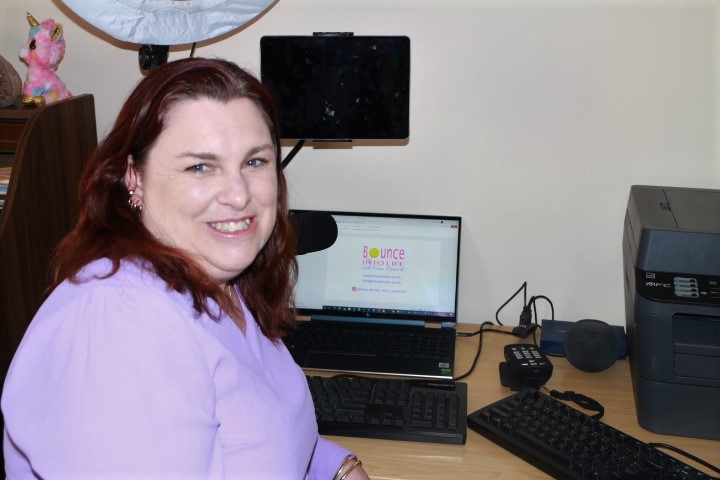Making her mark

Like many of us, Fiona Demark leads a full life — she works full-time, raises two teenage children, manages her own life coaching business, and even finds time for thrill-seeking on weekends. But the daily challenges she experiences as a result of her blindness mean that she needs extra support — and with JobAccess, Fiona knows she can get the help she needs to continue to thrive.
From an early age, Fiona has had the courage to test her limits, moving from outback Broken Hill to the city to complete a social work degree, becoming an inspirational speaker and life coach, and working to help others living with disability.
In her current role as a Senior Customer Resolutions Officer at VicRoads, Fiona works in a small, specialised team that supports the successful operation of the Accessible Parking Permit Scheme through Victorian local councils.
She is also the Chair of DoTABILITY — the Victorian Department of Transport’s employee working group for staff with disability, carers, and allies — and works voluntarily to assist with individual advice and advocate for more inclusive and accessible workplaces.
“I find that having a disability myself I can easily relate to assist our customers with their enquiries,” she says.
Fiona was born with cone rod dystrophy, an inherited eye disease that affects the retina and causes progressive vision loss. Today, she is considered legally blind, which is not black blindness but rather she can’t see at six metres with both eyes what someone with normal vision can see at 60 metres.
She describes herself as having 90 per cent vision loss in being able to detect light and dark and large objects, with no definition or clarity in what she sees.
Her disability impacts Fiona in all areas of life, including at work where she’s required to use a data management system to liaise with customers and local councils when processing permit applications.
Screen reader incompatible with work system
When Fiona began her current role in 2020, the data management system used to track customer enquiries was not compatible with Fiona’s screen reader, which translates on-screen information into speech or Braille. While these devices have opened up the internet for people who are blind or have low vision, they only work effectively on compatible websites and software packages.
In Fiona’s case her screen reader was not compatible with her workplace’s data management system, so she was unable to properly use the system to support customers.
Support for workplace changes
As she has done in the past and with the full support of her employer, Fiona lodged an online application for funding for work-related assistive technology through the Australian Government’s Employment Assistance Fund (EAF).
“I used to work at a disability employment services provider and was aware of the service for clients,” Fiona says, adding she was able to obtain funding for assistance in past positions over 25 years for screen readers, upgrades, training, and devices such as headsets and amplifiers.
JobAccess, which manages the EAF, quickly processed her application and arranged for a workplace assessment at no cost to Fiona or her employer. Experienced JobAccess Advisor and Mentor Manager Tania Hillan worked closely with Fiona to determine her barriers at work and what solutions would allow her to perform her role more easily.
With inputs from the workplace assessor, Tania then recommended funding for assistive equipment to support Fiona, including:
- Customised screen reader software for Fiona’s screen reader to make it compatible with the data management system at work
- An iPad to assist with meetings and video calls, management of information and navigation for meetings
- A Bluetooth headset to allow Fiona’s screen reader to operate without distracting others in the office
An opportunity to grow
Now fully installed in the office, the equipment allows Fiona, who also uses a long cane as a mobility aid, to be as productive as any other member of her team. She says if she were unable to obtain the customised software for her screen reader, she would not be able to perform her role.
“Without JobAccess I would not be able to do my role now and would not have had the opportunities to grow and develop through my career as my vision deteriorated,” she says.
The best part of working with JobAccess is the personalised service with her case manager and always getting prompt responses to enquiries, she adds.
Does Fiona have any advice for other people living with disability?
“You shouldn’t hesitate to apply because simple changes in your workplace can make all the difference to your job and like me help you overcome adversity in your life,” she says.
Like to learn more?
JobAccess has managed over 57,000 applications for workplace adjustments since 2006. Each one makes a difference by helping people with disability get work, keep work and be more productive.
Contact JobAccess on 1800 464 800 to speak to our friendly and resourceful Advisers about workplace adjustments and the Employment Assistance Fund. You can also submit an online enquiry through the JobAccess website.
Last updated:
